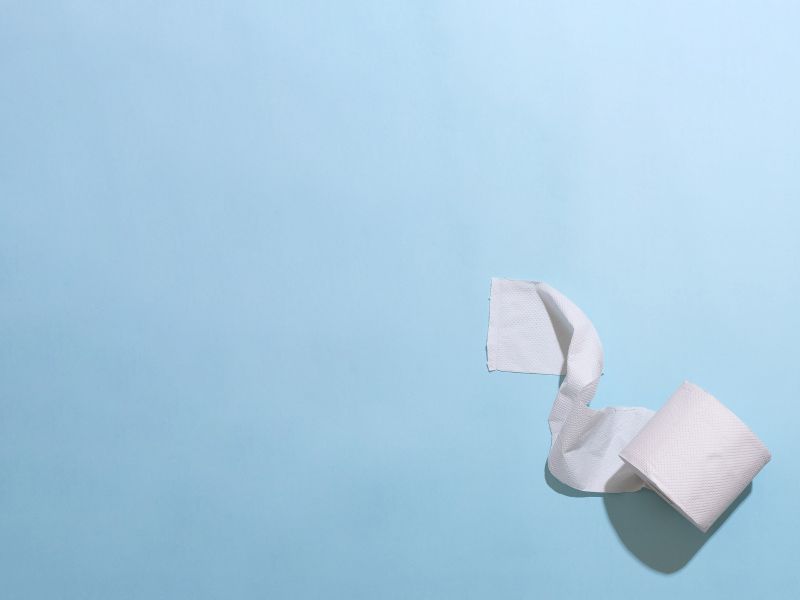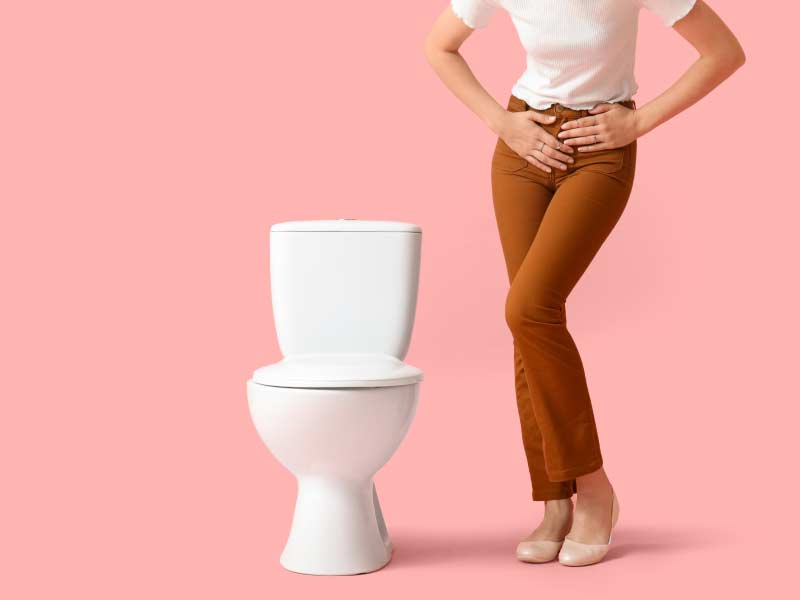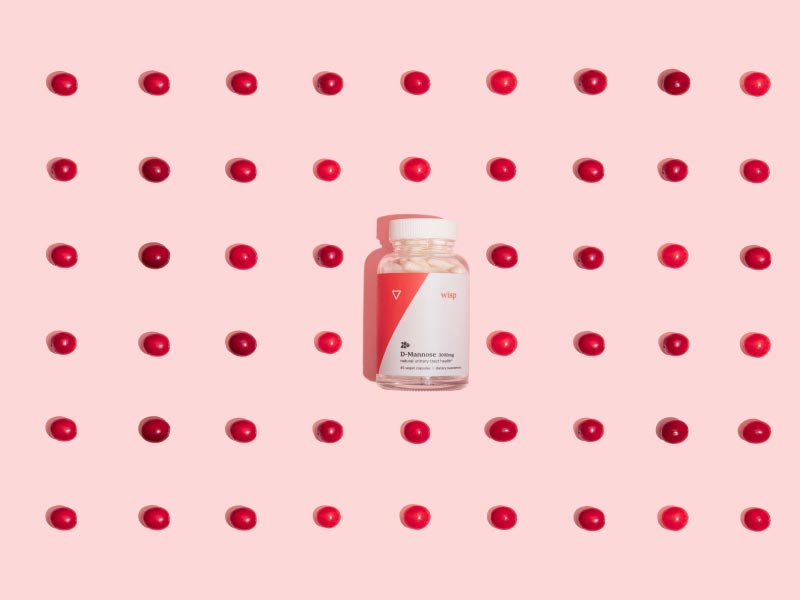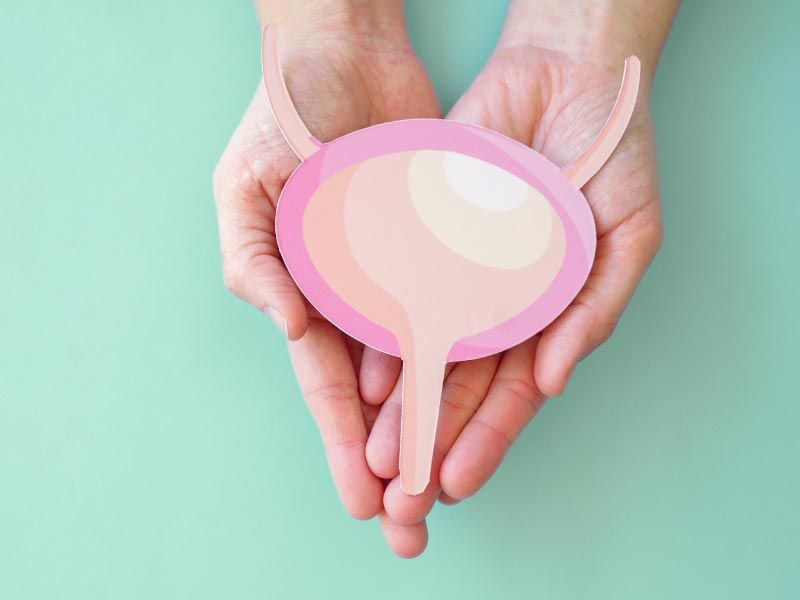
It's Burning When I Pee,
What Should I Do?
Published on July 2, 2020
Updated on March 7, 2025
Written by Kathleen Morrison
Medically Reviewed by Andrea Sleeth WHNP-BC, MSCP
That burning sensation when you pee? Uncomfortable, annoying, and definitely worth paying attention to.
It’s more common than you think, but let’s be real—no one loves talking about it. Even so, you don’t have to figure it out alone.
Plenty of things can cause that sting, from mild irritation to something that needs treatment. Maybe it’s just a reaction to a new soap or not drinking enough water. Or it could be a sign of an infection like a UTI or an STI. Either way, your body is telling you something, and listening sooner rather than later can save you a lot of stress (and discomfort).
Whatever’s going on, you deserve relief.
Burning Sensations and What Your Body’s Trying to Tell You
Having a burning sensation when you pee isn’t just annoying—it can mess with your confidence, your comfort, and even your daily routine. Some folks worry it’s something serious, while others cross their fingers and hope it’ll go away on its own.
The truth? That sting is your body’s way of waving a little red flag.
Most often, burning during urination (fancy term is “dysuria”) happens when the tissues in your urinary tract or genital area get irritated or inflamed. Even minor inflammation in these sensitive spots can lead to that sharp, uncomfortable feeling.
Why is it burning? A few possible reasons:
- Irritants in personal care products – Scented soaps, body washes, or douches can throw off your pH balance and trigger irritation.
- Not enough water – Dehydration leads to concentrated urine, which can make peeing feel hotter and more intense.
- Bacterial infections – A urinary tract infection (UTI) or sexually transmitted infection (STI) can cause inflammation and burning.
- Hormonal shifts – Changes in estrogen levels (from birth control, pregnancy, or menopause) can lead to dryness and sensitivity.
- Post-sex sensitivity – Friction, certain lubes, or even semen can temporarily irritate the urethra.
A little detective work goes a long way. Does the burning show up after using a new product? After a tough workout? After sex? If you notice a pattern, that’s a clue. Cutting back on potential irritants—like switching to fragrance-free soap, staying hydrated, or using a gentler lubricant—can make a big difference.
Here’s What Else to Look For
You’ve probably noticed that the burning sensation doesn’t usually show up alone—it tends to bring some unwelcome friends along. Paying attention to other symptoms can help you figure out whether a few home remedies might do the trick or if it’s time to reach out for professional care.
Common Symptoms That Come with Burning Pee
- Frequent urination urges – even when barely anything comes out
- Lower pelvic pressure or discomfort
- Cloudy, dark, or strong-smelling urine
- Pink or reddish-tinted urine (possible blood)
- Unusual discharge – potentially a sign that an infection may have spread
- Fever and chills – especially if the infection reaches your kidneys
If kidney stones are involved, you might feel waves of sharp pain in your lower back or sides, and the discomfort can shift as the stone moves. If hormonal changes (like menopause) are at play, dryness and itching can make urination extra uncomfortable—and irritation can quickly turn into a cycle of inflammation.
When to Take It Seriously
Wondering how to tell the difference between a minor irritation and something more serious? Here’s the deal:
- If you’re dealing with severe pain, high fever, or nausea, don’t brush it off—those can be signs of a more advanced infection.
- Over-the-counter pain relievers might take the edge off, but they won’t treat the root cause of an infection or an STI.
- The sooner you get treatment, the faster you’ll heal—and the less likely the issue will spiral into something worse.
Common Causes and What to Do
Yeah, it’s uncomfortable—and honestly, pretty frustrating. But this happens to almost everyone at some point, and there’s usually a clear reason behind it. The key is figuring out what’s causing the sting so you can get relief ASAP.
Some causes are minor and clear up on their own, while others need to be properly treated to stop them from getting worse. Let’s break it down.
Urinary Tract Infections (UTIs)
UTIs happen when bacteria (sometimes from your digestive system) sneak into your urinary tract. They can hit anywhere from your urethra to your bladder—or even your kidneys. That burning feeling is often one of the first signs, but you might also notice:
- A constant urge to pee (even when there’s barely anything there)
- Cloudy, dark, or strong-smelling urine
- Pressure or discomfort in your lower belly or back
UTIs, like bladder infections, don’t typically go away on their own, and if left untreated, they can lead to bigger problems. If you notice symptoms, getting antibiotics for a UTI quickly can help clear things up before they get worse.
Vaginal Infections
It’s not always a UTI. Yeast infections or bacterial vaginosis (BV) can also cause irritation, especially when urine passes over already inflamed skin. Some common signs include:
- Itching, redness, or swelling
- Unusual discharge (thicker, clumpier, or with a stronger smell than usual)
- A general feeling of discomfort down there
Hormonal shifts, antibiotics, or even new personal care products can mess with your vaginal balance. If symptoms aren’t going away, a provider can help you get the right treatment—whether that’s an antifungal for a yeast infection or prescription antibiotics for BV.
Sexually Transmitted Infections (STIs)
Certain STIs—like chlamydia, gonorrhea, and trichomoniasis—can cause painful urination, but they don’t always come with obvious symptoms at first. Even if burning is your only red flag, it’s still worth checking in, especially if you also have:
- Unusual discharge
- Pain during sex
- Pelvic discomfort
The only way to know for sure is to get tested. STI testing is fast, easy, and super important for protecting both your health and your partners. Plus, most bacterial STIs are easily treatable with antibiotics.
Kidney Stones
Kidney stones form when minerals build up and harden in your kidneys. They can move through your urinary tract, causing irritation (and some serious discomfort) along the way. In addition to burning when you pee, kidney stones can cause:
- Sharp pain in your lower back or sides
- Blood in your urine
- Nausea or vomiting
Staying hydrated is one of the best ways to avoid (and pass) small kidney stones. But if you’re in severe pain or notice blood in your urine, it’s time to check in with a healthcare provider.
Menopause and Hormonal Changes
If you’re going through menopause or experiencing hormonal shifts, you might notice dryness and thinning of vaginal tissues. That can make urination more uncomfortable and increase sensitivity. Some ways to ease the discomfort include:
- Staying hydrated
- Using gentle, fragrance-free lubricants or vaginal moisturizers
- Talking to a provider about hormonal treatments if symptoms are persistent
How to Decipher What’s Causing It
All of this is your body’s way of flagging that something’s off. The good news is that figuring out the cause is usually quick and straightforward, so you can start feeling better ASAP.
Healthcare providers use a few simple steps to get to the root of the issue:
- Personal Health Check-In – You’ll be asked about recent lifestyle changes, medications, hydration, diet, and sexual activity. These details help rule out obvious triggers.
- Urine Tests – A quick pee test checks for bacteria, white blood cells, or other signs of infection. In many cases, this is enough to confirm what’s up.
- Additional Testing (If Needed) – If your symptoms don’t have a clear cause, you might need:
- A urine culture – identifies the exact bacteria at play, making treatment more precise.
- Blood work – helps check kidney function or spot a more widespread infection.
- Imaging tests (ultrasounds or CT scans) – If kidney stones or structural issues are a concern, imaging can provide a clearer picture.
Finding out what’s causing painful urination is a huge relief because it means you can actually treat the problem, not just mask the symptoms. Whether it’s antibiotics, a shift in daily habits, or further testing, the right care can make all the difference.
Treatment Options for Burning When I Pee
Once you know what’s causing the discomfort, there are plenty of treatment options to get you back to feeling good. Sometimes, simple at-home care does the trick. Other times, a targeted treatment plan (like prescription antibiotics or antifungals) is the fastest way to stop the burn.
If your symptoms aren’t improving after a few days, it’s worth checking in with your doc. Some issues clear up easily, while others need a little extra help.
Antibiotics for UTIs
If a urinary tract infection is the culprit, UTI antibiotics are usually the go-to fix. The right medication depends on the type of bacteria involved, but the most important thing? Take every single dose. Even if you feel better after a day or two, stopping early can give the infection a chance to come back stronger. No thanks.
Antifungal Treatments for Yeast Infections
When yeast or bacteria overgrow in the vagina, it can lead to burning, itching, or irritation—especially when you pee. Over-the-counter antifungal creams or prescription pills can help restore balance and calm things down. Some people also find that reducing sugar intake helps since yeast thrives in sugary environments.
STI Treatments
Certain sexually transmitted infections (STIs) can cause painful urination, but the fix is often simple: prescription antibiotics or antiviral medication, depending on the infection. The key is getting tested ASAP so you can get the right treatment and steer clear of complications. And if you want to avoid a repeat situation, safer sex practices—like using condoms—go a long way.
Managing Kidney Stones
If kidney stones are behind your symptoms, your treatment plan will depend on their size. Small stones usually pass on their own (with lots of water and some pain relief). Larger or more stubborn stones might require procedures like shock-wave therapy to break them up. Either way, keeping your hydration game strong can help keep new stones from forming.
Hormone Therapy for Menopause
If vaginal dryness or thinning tissues are making bathroom breaks painful, hormone-based treatments like low-dose estrogen creams or hormone replacement therapy (HRT) might help. These options can relieve irritation and strengthen sensitive tissues. A provider can help you decide what’s right for your body and lifestyle.
Finding What You Need
Sometimes, relief may need to come from a mix of solutions—like prescription medication, hydration, and gentle cleansers. Tracking your symptoms can help you and your provider figure out the best approach. The sooner you take action, the sooner you’ll be back to feeling good in your body.
How To Avoid That Burning Sensation
No one wants to deal with the dreaded bathroom sting, but the good news is that a few simple habits can help keep it from happening in the first place.
Whether it’s staying hydrated, practicing good hygiene, or making small lifestyle tweaks, you can take charge of your urinary and sexual health before discomfort even starts. While these changes aren’t a sure-fire way to avoid any problems, they can definitely help and offer you peace of mind.
Stay Hydrated
Drinking enough water is one of the easiest ways to keep your urinary system (and the rest of your body) happy. Hydration helps flush out bacteria before they have a chance to cause trouble—plus, diluted urine tends to be less irritating. The standard eight glasses a day is a solid goal, but your needs might vary based on activity level, climate, and individual health. Bottom line? More water = happier bladder.
Keep Things Clean (Without Overdoing It)
Everyday hygiene plays a big role in avoiding and managing infections of all sorts:
- Wipe front to back. This helps keep bacteria from sneaking into your urethra.
- Change out of wet clothes quickly. Yeast and bacteria love warm, damp environments.
- Use gentle, fragrance-free soaps. Harsh cleansers can throw off your natural balance, making irritation more likely.
That said, less is usually more when it comes to intimate hygiene. Your body already does a great job of keeping things clean and balanced—just give it the support it needs.
Practice Safe Sex
Sexual activity can introduce bacteria into the urethra, but a few simple steps can help reduce the risk of infections:
- Use condoms to lower the chances of STIs that can lead to painful urination.
- Pee after sex to help flush out any bacteria that might have found their way near the urethra.
- Be mindful of lubes and condoms—some ingredients can cause irritation, so if you notice a pattern, consider switching things up.
Know Your Triggers
Sometimes, it’s the tiniest little things that make a difference. Certain foods and drinks—like alcohol, caffeine, or spicy foods—can irritate the bladder, so if you notice a connection, cutting back might help. Stress can also play a role since muscle tension can put added strain on those sensitive tissues.
Stay Proactive With Check-Ups
Regular check-ins with a healthcare provider—whether in person or through telehealth—can help you catch potential issues early on. Even a quick symptom review can highlight patterns and give you a plan for avoiding future problems.
When to Seek Medical Help
Sometimes, no amount of extra water or home remedies will cut it. If that burning sensation sticks around or comes with other symptoms, it might be time to call in backup. Taking action early can save you from bigger (and more painful) problems down the road.
If you’re dealing with any of these symptoms, a quick chat with a provider is a smart move:
- Burning that won’t quit—especially if it lasts more than a few days or keeps coming back.
- Pain in your lower back or sides could mean an infection is spreading to your kidneys.
- A high fever, chills, or nausea can signal a more serious infection.
- Blood in your urine might look pink, red, or brownish.
- Pain during sex or unusual discharge, which could point to an STI or another underlying issue.
While some irritation can clear up on its own, ignoring persistent symptoms can allow hidden issues to escalate—and nobody wants that. A quick test or consult can give you peace of mind and a solid plan to feel better, faster.
Take Charge of Your Own Comfort
Burning when you pee is uncomfortable, frustrating, and—let’s be real—incredibly disruptive. But you don’t have to suffer through it or try to guess what’s going on.
Paying attention to your symptoms and possible triggers is the first step toward getting relief. Staying hydrated, using gentle personal care products, and checking in with a provider when needed can all help you feel better, faster.
Talking openly about your symptoms with a provider can also take a massive weight off your shoulders. Whether you need a prescription, lifestyle tweaks, or just reassurance that everything’s okay, you should never feel embarrassed about taking care of your body.
At Wisp, we make sexual and reproductive healthcare easy, private, and judgment-free—because no one should have to navigate these issues alone. A little knowledge (and the right support) can go a long way in keeping you comfortable and in control of your health.
Wisp treatment options are available only after consultation with a licensed medical professional. You should consult with your healthcare provider before starting a new supplement or treatment regimen. Individual results may vary.
This blog post is for informational and educational purposes only and should not be taken as professional advice. Always consult with a qualified professional before making any decisions based on the information provided here.





